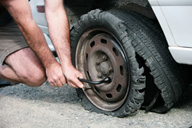Stay on Track to Your Destination With Regular Tire Maintenance

"Unfortunately, 83 percent of motorists aren't aware of how under- or over-inflated tires affect a vehicle's steering and breaking control as well as fuel economy," explained Mark Ballard of Discount Tire, the world's largest tire and wheel retailer. "In addition, regularly checking your tires for uneven or worn tread and bald spots, as well as replacing all four tires instead of one or two at a time, will help avoid hazards like blowouts and keep you on track to your destination."
According to the Rubber Manufacturers' Association (RMA), more than 23,000 tow-away crashes were due to flat tires.
Here are the top five tips to ensure proper tire safety:
1. Get Pressure Right. In its 2011 Tire Care Awareness Survey, the RMA found that 62 percent of drivers don't know where to find the correct inflation pressure for their vehicle. The specific inflation pressure number can be found on the vehicle placard located on the driver's side doorpost, glove box door or fuel door or in the owner's manual. For accurate pressure, check tires when cool, and don't forget the spare. A properly inflated tire will save you nine cents per gallon at the gas pump and improve vehicle fuel efficiency by 3.3 percent.
2. Don't Overload Vehicle. Overloading decreases fuel economy due to increased wind drag and cargo weight. Handling, control and braking are also negatively impacted.
3. Rotate Before You Go. Regular rotation helps achieve uniform tire wear and improve road performance. Tires rotated every 6,000 -- 8,000 miles prolong the life of the tire and help maximize your tire investment. It makes sense to get a tire inspection when you rotate.
4. Straighten Up. Proper tire alignment provides safe, predictable vehicle control as well as a ride that is smooth, comfortable and free of pulling or vibration. Proper alignment helps tires wear evenly and last longer.
5. Bald Isn't Beautiful. The RMA survey also found that 52 percent of drivers do not know how to tell if their tires are bald. Lack of tread affects the tire's ability to grip wet roads. Make sure tires don't have uneven wear, high or low areas or unusually smooth areas that can increase the risk of road accidents.
To get more information on tire maintenance and safety, visit www.tires.com.

No comments: